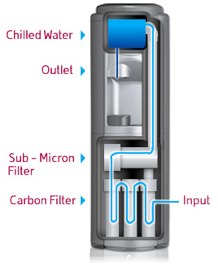Bottled water dispensers obviously require the need for large plastic bottle reservoirs that sit on top of the machine, but what impact is the creation of these plastic bottles having on our environment? Although they are not the only place plastic bottles are being used, they are a contributing factor. so how big and issues is this?
A good place to start is that the World Wide Fund For Nature reports that a staggering 1.5 million tons of plastic is used to bottle over 89 billion litres of water each year. With the vast majority (8 out of 10) of bottles finding their way to land fill where they take up to 700 years to decompose. Plastic cannot begin decomposing until the chemical bonds between the atoms of the plastic begin to break down, which takes at least 500 years.
However, energy wastage begins from the initial production of the bottles, as large amounts of energy and fossil fuels need to be used to manufacture this vast amount of plastic. Plastic bottles are made up of a number of different resins, the most common being high and low density polyethylene, which are simply bi-products of crude oil. As many of you know, oil is a precious natural resource and our over consumption is resulting in higher prices per barrel. Also using raw materials such as oil in any production significantly increases the output of green house gases. While it takes around 2,000 pounds of oil to create just one ton of plastic and with millions of tons being created, the figures are quite alarming.
Once the production of the bottles is complete they are then transported by sea, sky, rail or road to the filling plants. Thus emitting more CO2 into the earths atmosphere. The moment the bottles have finished at the filling plant they are once again transported. Finding their way to distribution centers (where they will once again need transporting from), shops or directly to the consumer. When the plastic bottles are in the distribution centers or shops they have to be kept refrigerated using high CO2 emitting industrial refrigerators.
So what can be done to stem this ever growing effect on the environment? Well, recycling is one of the most obvious solutions. But even the reuse of these bottles for a water dispenser has a negative impact. To be refilled they have to be shipped again back to the refilling plant (more CO2). At the refilling plant they have to be washed and sterilised, before being filled and shipped back to the customer again, and so the cycle continues, using more energy and CO2 consumption. So although re-usable bottles reduces the amount of plastic bottle production required, the recycling process itself has an negative environmental impact.
So what happens at the of the a bottles life span? A large proportion ends up in landfill, but many suggest that they should be recycled. However many countries including the United Kingdom do not posses the capabilities to recycle these plastic bottles. Instead they are shipped over to China where they can be either recycled or simply incinerated. This makes many people ask whats they point of recycling, when even more CO2 is emitted in order to recycle?
So when it comes to supplying drinking water in the workplace, what could you do to help mitigate the effect plastic bottle production, re-filling and recycling is having? The obvious solution would be to simply purchase a bottle-less water dispenser. Many office type water coolers today simply use a tap or a mains feed to supply water to the dispenser. They come with built in water filters to improve taste and quality, and many water dispensers have a chiller to provide the perfect drinking water solution.
It has been proven that mains fed water is just as good or in some cases better for you than many bottled waters. Research has also found that a number of people in a blind taste test, actually preferred the taste of simple tap water to that of some of the most expensive and well known bottled waters from around the world.
So in conclusion, this begs the question: “Why are more people not drinking mains fed water?” In my opinion, all businesses have an obligation to do the right thing for the environment, so the time to take action is now. Look at the type of water dispenser you see being used in your office or workplace and campaign to get it replaced if it uses those large plastic water bottles.


Greetings! Very helpful advice in this particular article! It’s the little changes that will make the most important changes.
ReplyDeletewater dispensers in Sharjah